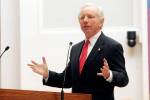Democrats now suffer the Republican fate
Now the Democrats know how the Republicans have felt for, oh, the past 52 years or so.
For months, before Donald Trump won his struggle to capture the Republican nomination, warning of riots at the convention if he was denied his prize, the GOP worried that the party would be torn once again between the conservative faction and the establishment.
But now Trump has clinched the nomination, mathematically and rhetorically. Now, the GOP is divided only among those who are quietly simmering and those who have become Trump supporters with varying degrees of reluctance and sincerity.
Over on the Democratic side, however, the battle between a social Democrat and an establishment one continues, and looks like it will for quite some time. Vermont Sen. Bernie Sanders vows to carry on all the way to the convention in late July, even though Hillary Clinton will likely win enough delegates next week to claim the nomination. The party has offered Sanders a strong hand in shaping the platform, but he’s smart enough to recognize that empty gesture as insufficient for a man who has won 20 states.
Now, the Democrats can suffer the self-inflicted wounds as Sanders supporters accuse their party’s establishment of treachery and the front-runner of being insufficiently committed to the ideals for which the party should stand. “The political establishment is getting nervous,” Sanders said, campaigning in California where the polls have narrowed. “The corporate establishment is getting nervous. And they should be nervous. Because real change is coming.”
Probably not, in all honesty. But if anybody can make the Democrats in Name Only squirm, it’s Sanders. He’s the Ron Paul of the Left, only far more successful. And he has the same effect that Paul and conservatives going back to Barry Goldwater have had on Republicans: drawing an uncomfortable contrast with the pragmatists.
Still, it’s not to say the Republicans have it easy. Even with Trump as the presumptive nominee preparing for a gold-plated coronation in Cleveland, the Nevada party is fighting the same old civil war.
Not only did the state GOP party convention pass a resolution condemning the signature achievement of the most popular Republican governor perhaps ever — the education reform tax package passed by the 2015 Legislature — it also endorsed conservative challengers to its top elected officials in the Legislature.
It probably shouldn’t come as a surprise. As the tax package was being debated, Gov. Brian Sandoval faced criticism and opposition from fellow Republican constitutional officers (except Lt. Gov. Mark Hutchison). And one of those officers — state Controller Ron Knecht — ran a group that circulated a petition to try to undo the centerpiece of that tax package, a commerce tax on business revenue of more than $4 million per year.
But for the petition’s poor wording, voters might have been asked to repeal the commerce tax on November’s ballot.
But establishment Republicans are no longer alone in their misery. Now, their Democratic counterparts suffer the same fate, as Sanders supporters accuse them of incrementalism, insensitivity to the needs of real people, and being utterly unimaginative when it comes to making what Sanders calls real change.
Sadly, the American people will probably never get a chance to see a debate between factions, the socialist Sanders taking on a conservative such as Sen. Ted Cruz of Texas or Sen. Rand Paul of Kentucky. Instead, they’ll have to settle for an establishment Democrat versus a wild-card Republican (but one who’s most definitely not a conservative).
More’s the pity.
Steve Sebelius is a Review-Journal political columnist and co-host of “PoliticsNOW,” airing at 5:30 p.m. Sunday on 8NewsNow. Follow him on Twitter (@SteveSebelius) or reach him at 702-387-5276 or SSebelius@reviewjournal.com.























